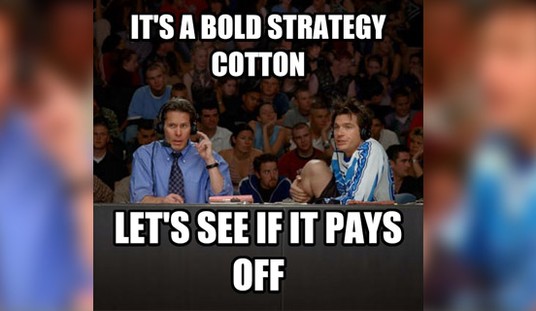We suspect many of you know this, but in 1991, the band Nirvana released its breakthrough album Nevermind. Here’s the music video for what can only be called the breakthrough hit of that album ‘Smells Like Teen Spirit.’
In this author’s opinion, Nevermind is one of the greatest—and most influential—albums of all time. If you have never listened to it, we recommend giving it a chance.
The cover of the album was simply a baby, underwater in a swimming pool, chasing a dollar bill on a fishhook. What it meant was open to interpretation, but one common interpretation is that it was meant as a commentary on young musicians chasing big music corporation dollars or capitalism in general.
And the baby was naked with his penis visible.
That baby was Spencer Elden. He is grown up now, and, a couple years back, he attempted to sue pretty much everyone connected to that album cover, claiming it was child pornography. The case was dismissed below, but a few days ago we got word that the case was revived by the Ninth Circuit.
9th Circuit panel says Nirvana’s naked Nevermind baby can sue the band, its members, and the record label for child porn damages https://t.co/TcgAelUOgi pic.twitter.com/crIUVWgkom
— Mike Sacks (@MikeSacksEsq) December 21, 2023
All-Republican panel (GWB, Trump, Trump) FWIW (and not sure it’s worth anything on this)
— Mike Sacks (@MikeSacksEsq) December 21, 2023
This holding seems like a big deal in general? pic.twitter.com/gNOUZJYDgL
— Mike Sacks (@MikeSacksEsq) December 21, 2023
(NOTE: This doesn’t mean dude has proven the album cover was, indeed, child porn (which would implicate the millions upon millions of people who bought the album since its 1991 release…), just that he can now make his case that it was (absent any other jurisdictional bar))
— Mike Sacks (@MikeSacksEsq) December 21, 2023
We took a moment to read the opinion and the central question is whether or not this whole thing is barred by the statute of limitations. The ‘base’ statute of limitations is 10 years (with some exceptions that are not relevant here), and given that the album is old enough to be featured on classic rock radio (ugh), that would seem to be the end of it.
But what the court found was that the statute of limitations was triggered freshly every time the image is republished—and that has happened within the last ten years.
The court importantly also said this in a footnote: ‘The question whether the Nevermind album cover meets the definition of child pornography is not at issue in this appeal.’ We get the feeling that the judges felt that the suit is meritless, but they will wanted to have a nice, long statute of limitations for the next plaintiff who might be a genuine victim of child porn.
But in this case, bluntly, the substantive argument is ridiculous. This album cover is not child porn. All of this is based on Federal child pornography law and this is how the term ‘child pornography’ is defined in 18 U.S.C. 2256:
(8) ‘child pornography’ means any visual depiction, including any photograph, film, video, picture, or computer or computer-generated image or picture, whether made or produced by electronic, mechanical, or other means, of sexually explicit conduct, where—
(A) the production of such visual depiction involves the use of a minor engaging in sexually explicit conduct;
(B) such visual depiction is a digital image, computer image, or computer-generated image that is, or is indistinguishable from, that of a minor engaging in sexually explicit conduct; or
(C) such visual depiction has been created, adapted, or modified to appear that an identifiable minor is engaging in sexually explicit conduct.
So, if you pick through that, you see that all of this depends on the definition of ‘sexually explicit conduct.’ And that is defined earlier in the same statute as:
(i) graphic sexual intercourse, including genital-genital, oral-genital, anal-genital, or oral-anal, whether between persons of the same or opposite sex, or lascivious simulated sexual intercourse where the genitals, breast, or pubic area of any person is exhibited;
(ii) graphic or lascivious simulated;
(I) bestiality;
(II) masturbation; or
(III) sadistic or masochistic abuse; or
(iii) graphic or simulated lascivious exhibition of the anus, genitals, or pubic area of any person;
And for reference, here’s a slightly censored picture of the same album cover:
Appeals Court Reinstates Spencer Elden’s “Nirvana Baby” Child Pornography Lawsuit
— Radio Future (@Radio_Future_) December 21, 2023
Listen to Radio Future at https://t.co/mx4T1hOtDG#Music #Movies #Cover #Radio pic.twitter.com/RVv4GbdSHz
The original picture does not cut off there, but you get the idea. It was famously spoofed on (in a neutered fashion) by Mad Magazine:
Nevermind and Barack Obama on the cover of MAD Magazine. pic.twitter.com/W6P2GVUp
— ♥Nat♥ (@AnOldEnemy) January 24, 2012
Going back to that statute, most of that definition requires some kind of act that one would describe as sexual. This is just a baby swimming in a pool. The only argument Elder could possibly make would have to rely on the claim that this is a ‘graphic … lascivious exhibition of the … genitals … of any person.’
The place where the entire argument fails is on the requirement of lasciviousness and to be blunt, that requires more than mere nudity. It is not inherently illegal to take a picture of a naked child. Your baby photos of your kid messing around in the tub is not a crime. And that is what we have with this album cover—mere nudity. And bluntly, we think that if it was ever found that the image was illegal child pornography, that would merely result in the court striking that law down because it obviously is not anything abusive or anything that can be criminalized under the First Amendment.
And, of course, it gets even more ridiculous when you consider something else. Courthouse News went over this litigation’s history …
‘Nirvana baby’ child porn suit revived by Ninth Circuit @courthousenewshttps://t.co/15YwnQlx7I
— Edvard Pettersson (@edpettersson) December 21, 2023
… and they have this damning passage:
In their request to dismiss the lawsuit, the defendants said Elden had spent 30 years profiting from his celebrity as ‘the self-anointed 'Nirvana Baby.'‘
‘He has reenacted the photograph in exchange for a fee, many times; he has had the album title 'Nevermind' tattooed across his chest; he has appeared on a talk show wearing a self-parodying, nude-colored onesie; he has autographed copies of the album cover for sale on eBay; and he has used the connection to try to pick up women,’ the defendants said in their motion to dismiss.
In short, they paint the picture of a guy who just thinks he found a creative way to profit from the album cover and we are inclined to agree. He might even know he is going to lose and is just hoping to get ‘go away money.’ It’s a perfect example of how our easily-abused legal system can be used to harm freedom of expression.
Naturally, there were reactions:
— Snarkyposters (@snarkyposters) December 21, 2023
A few years back I had Attorney Margaret Mabie guest in our class after I saw her on CNN. Chris Cuomo was discourteous and dismissive of the claim and the attorney and I hope he sees this today. @mabie_maggie is a serious person at a serious firm that does not take this lightly. https://t.co/NwEsjgsLUO
— Kevin Casini (@KCEsq) December 21, 2023
We can't believe we are saying this, but we are with Chris Cuomo on this.
This is so ridiculous. https://t.co/vqejkHFr7r
— AJ Lea (@adamjohnlea) December 21, 2023
Money grab if I’ve ever seen one
— Tim (@BoyDadFarmer) December 21, 2023
Maybe the album cover was prophetic.
This is the most ridiculous lawsuit
— Anne (@Miss_Scots) December 21, 2023
So basically just a ruling on the statute of limitations issue. Still seems like a tough hill to climb for the plaintiff if this makes it to trial. The underlying argument to me is a stretch.
— It's Me (@LAinsidernow) December 21, 2023
I suppose they weren't addressing the merits, but this is dumb. Does anyone in their right mind think that photo was pornography?
— Chasing Ennui (@rwlesq) December 21, 2023
I mean, what were people expecting? A denial, a denial, a denial, a denial?
— Matt Kelly (@compliancememe) December 21, 2023
Okay, that was pretty clever. And since we started off with that music video, you have a decent chance of getting the joke—if you can understand what Kurt Cobain is saying.
And that a big ‘if.’ We loved the guy, but he was not known for clear enunciation.
***
Editor's Note: Do you enjoy Twitchy's conservative reporting taking on the radical left and woke media? Support our work so that we can continue to bring you the truth. Join Twitchy VIP and use the promo code SAVEAMERICA to get 40% off your VIP membership!
























Join the conversation as a VIP Member